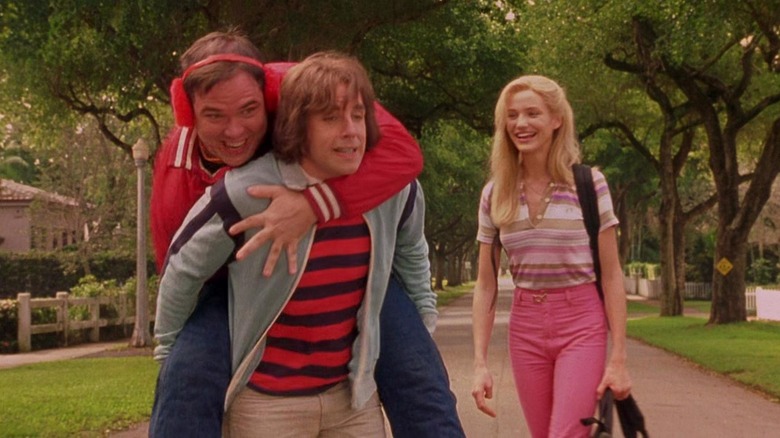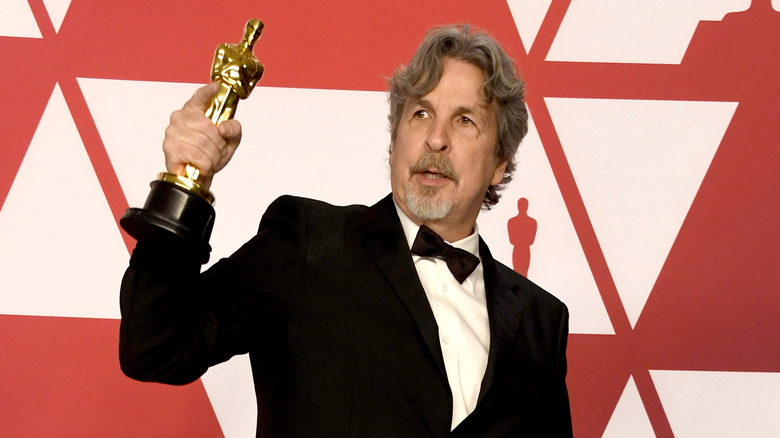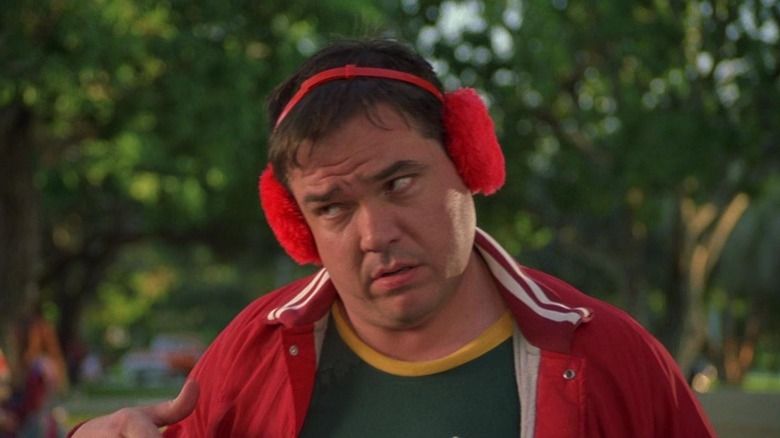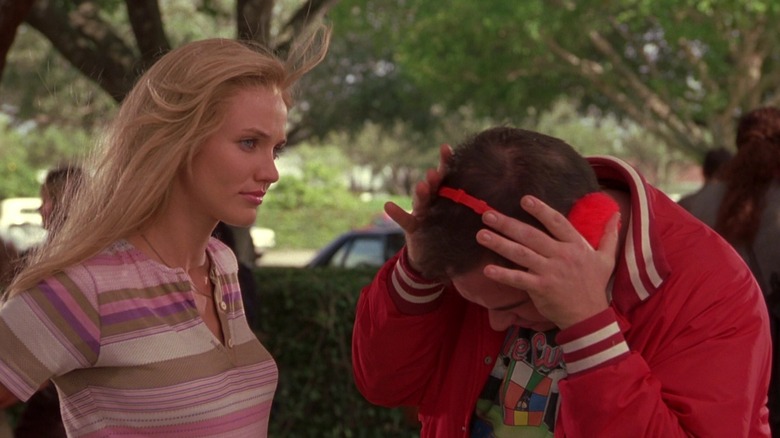The One Thing Director Peter Farrelly Would Change In There's Something About Mary [Exclusive]
Comedy feels like it's in a delicate state these days. Not only are studios avoiding tentpole comedy movies for the most part, but the onslaught of what many perceive as "cancel culture" has resulted in a little more caution when it comes to telling jokes, whether that's on the big screen or in comedy clubs. While there has been a lot of admirable progress with regards to cultural issues in comedy, the argument could be made that there is such a thing as being too sensitive, especially when it comes to an art form that is well-known for mining laughter from irreverence and provocation.
This careful approach to comedy has resulted in a lot of retrospective analysis of comedies from yesteryear, much of which often results in people saying, "You could never make that movie today." This has been applied to everything from "Blazing Saddles" (typically from people who don't understand why the movie still works as racial satire in today's environment) to "Tropic Thunder" (again, showing a fundamental misunderstanding of the comedy in question, specifically with regards to Robert Downey Jr.'s performance).
Another such movie that has seen the same assessment is "There's Something About Mary," one of the many raunchy, hit comedies from filmmaking duo Peter & Bobby Farrelly, who also gave us "Dumb & Dumber" and "Me, Myself & Irene." However, Peter Farrelly thinks that his risqué romantic comedy starring Ben Stiller and Cameron Diaz could absolutely still be made today. But there is one thing that he would change about it.
'But you gotta remember, you're always going to offend somebody'
Leading up to the release of Peter Farrelly's "Ricky Stanicky" (starring the exceptionally funny John Cena), a return to comedy after winning an Oscar for "Green Book" in 2018, we spoke with the filmmaker about the state of comedy, especially with regards to the hesitation to lean into more provocative material. Farrelly acknowledged and lamented that precarious situation when it comes to finding laughs:
"People are afraid, afraid to offend. Like stand-up comedians, they don't want to go to college campuses, because they're afraid. I think that's why studios are afraid. I think it's a similar thing. They get letters and they're saying, "Oh, we can't make that, we can't do this." But you gotta remember, you're always going to offend somebody, and if you don't, it's gonna be mush, you know? It really is. So you just have to say, if your heart's in the right place, and the character's heart's in the right place, and you trust it, then you can defend it. And that's how I feel."
However, before you think Farrelly is totally opposed to the progress that has been made when it comes to comedy's treatment of certain social and cultural communities, think again. Farrelly added, "Let me also say, the whole PC movement and all these movements in the last five to six years are great. They've been important, but there's a point where you say, 'Okay, let's calm down here now.' There's these changes and they've been awesome. But that doesn't mean you can't tell any more jokes. You gotta be able to have a little freedom as a human being to say stuff that you wanna say."
Then the director continued by referring back to "There's Something About Mary," and he acknowledged what he would change based on the evolution of our societal norms.
There's something about Warren
For those who don't recall, the movie follows Ben Stiller as a guy named Ted who's looking to track down his high school sweetheart Mary (Cameron Diaz) after reflecting on a disastrous prom night so many years ago. After hiring a sleazy private investigator named Pat (Matt Dillon) to track her down, Mary is so alluring that Pat can't help but try to win her over himself. Once Ted learns that Pat lied about Mary's current status as a way to throw him off, he enters Mary's life and tries to spark a bit of romance again.
Alongside Mary is her brother Warren (played by W. Earl Brown), a neurodivergent character who Mary is very protective of in the face of mockery. The movie uses Warren for comedy, but he's never the butt of the joke. Instead, the comedy comes from how Ben Stiller's Ted (and Matt Dillon's scheming Pat) interacts with him, often unsure of the best way to approach Warren without startling him, due to his uncertainty about strangers and a sensitivity regarding his ears. But even so, it's how Warren is portrayed that Farrelly would change today.
Farrelly affirmed that today he's "more aware in good ways," and even though people say "There's Something About Mary" couldn't be made today, the filmmaker disagrees. But here's where his contemporary perspective would adjust his approach somewhat:
"What I would do differently, I would have had, the brother Warren, I would have used an actor with a intellectual disability instead of another actor. Even though, by the way, the actor in it was incredible, there's too many actors out there with intellectual disabilities who don't get those opportunities. I didn't know that at the time. I didn't realize that they were there, and I've learned a lot since then about that."
We've come a long way
Brown does a fine job portraying the character without turning Warren into an insulting punchline, even if the performance itself is more broad at times, but if one was to make the film today, it just makes sense to let a neurodivergent actor portray that role. Not only does it give actors with fewer opportunities like this a chance to shine, but it provides representation and avoids the risk of an offensive portrayal.
"The Ringer" (produced by the Farrelly Bros. and another movie often lumped in as the kind of comedy you can't make anymore) afforded a step forward in that regard for neurodivergent actors, treating them with respect and letting them be funny without becoming a punchline. Though not all the main characters with intellectual disabilities were portrayed by actors who actually had those disabilities, the film still featured hundreds of developmentally disabled actors and even crew members. More recently, movies like "The Peanut Butter Falcon" and Bobby Farrelly's "Champions" have provided greater opportunities for neurodivergent actors too. So we've certainly come a long way since "There's Something About Mary."
It's nice to hear Farrelly reflect on this without doubling down and acting indignant about this kind of retrospective assessment. It can be difficult to accept missteps in our past, especially on such a public stage, but as long as people are willing to listen and adjust their perceptions to accommodate marginalized communities, especially those who are often still treated with prejudice today, then we'd avoid a lot of senseless conflicts altogether.



